Short Fuse Book Review: “The Eichmann Trial” — Monster & Nonentity
Author Deborah Lipstadt’s decision to confront a Holocaust denier in court prepared her, as little else might have, to appreciate and convey the vastly greater complexity and historical import of the Eichmann trial.
The Eichmann Trial by Deborah Lipstadt. Schocken Books, 272 pages, $24.95.
Deborah Lipstadt’s new book is three things joined forcefully together. It is, as the title states, a reprise, a half a century after the event, of the trial, conducted in Jerusalem under global spotlights, of Adolf Eichmann, which resulted, in 1963, in his being convicted of and executed for “crimes against the Jewish people [and] crimes against humanity.” Lipstadt’s book is also a welcome, finely balanced critique of Hannah Arendt’s Eichmann in Jerusalem, which has not ceased to arouse controversy or exert influence since publication in 1963. Susan Neiman, for example, calls it (in her Evil in Modern Thought: An Alternate History of Philosophy) “the twentieth-century’s most important philosophical contribution to the problem of evil.” Not least of all, Lipstadt’s book is a warning against Holocaust denial, which, in all its mutations, she maintains, serves to rearm the anti-Semitism that resulted in the genocide itself.
Though Holocaust denial is not the chief focus of this book—as it was of Lipstadt’s previous volume, Denying the Holocaust: The Growing Assault On Truth and Memory (1993)—it cannot but assert itself in the narrative. On June 10, 2009, while Lipstadt was doing research at the United States Holocaust Museum, Stephen Tyrone Jones, a long-term guard at the institution, was shot to death by an “eighty-eight year old racist, anti-Semite, and Holocaust denier” who had hidden a rifle beneath his coat and pulled it out as Jones helped open the museum’s heavy glass door for him. The book is dedicated to Jones and the two guards who apprehended his killer and, by extension, to the line of visitors stretching “around the block and down the street” when the museum reopened two days later. “They had come,” Lipstadt heard some say, “precisely because the shooter wanted to keep them away.”
What Lipstadt calls her formative “personal encounter” with Jew hatred occurred earlier. In Denying the Holocaust, she had characterized David Irving, a popular British writer and historian, as “the world’s leading Holocaust denier.” When asked why “he had eliminated all references to the Holocaust from a new edition of his book on Hitler,” Irving replied, “If something didn’t happen, then you don’t even dignify it with a footnote.” According to Irving, there was no “overall Reich policy to kill the Jews” and “gas chambers were an impossibility.”
When Denying the Holocaust was published in the United Kingdom, Lipstadt learned that Irving was bringing a libel suit against her. As an American citizen, she was not obliged to appear in English court. If she did, she had to abide by the rules peculiar to English libel law, which reverse those of the American system. The onus would be on her to demonstrate, not that Irving had lied about the Third Reich and was sympathetic to it, as she had averred, but that she had told the truth: in short, anti-Semitism, crucial to Hitler and the Nazi regime, culminated in the Holocaust.
Lipstadt was well aware of the Eichmann trial and of the fact that the testimony of survivors, heard at length there for the first time, played a decisive role. She did not want to call on such testimony again, nor to have to prove, from scratch, that there had been death camps, gas chambers, a Final Solution. She hoped to let the historical record, as the Eichmann trial helped establish it, speak and be sufficient: “Because the Holocaust had the dubious distinction of being the best-documented genocide in history, we considered [testimony of survivors] unnecessary.” And yet it was appeal from survivors that helped convince Lipstadt to override the advice from friends and colleagues who urged her to ignore David Irving’s obviously specious suit. “I became convinced,” she writes, “that I owed the survivors a full-fledged fight against those who would assault their history.” For them, she knew, Irving’s Holocaust denial “meant the Eichmann trial was ongoing.”
She could not have hoped for more complete legal vindication. In April, 2000, after a 12-week trial, the judge summarized the court’s 333 page verdict by writing that “Irving has for his own ideological reasons persistently and deliberately misrepresented and manipulated historical evidence; that for the same reasons he has portrayed Hitler in an unwarrantedly favourable light, principally in relation to his attitude towards and responsibility for the treatment of the Jews; that he is an active Holocaust denier; that he is anti-Semitic and racist, and that he associates with right-wing extremists who promote neo-Nazism. . . . It follows that there must be judgment for the Defendants.”
Besides being exemplary in its own right, Lipstadt’s decision to confront Irving in court prepared her, as little else might have, to appreciate and convey the vastly greater complexity and historical import of the Eichmann trial.
It is hard, even at this remove, to disentangle the multiple threads knotted together in that trial. For Ben-Gurion, Israel’s Prime Minister, authorizing the Israeli secret service to spirit Eichmann out of Buenos Aires was, among other things, a way of declaring that Israel was the definitive center of world Jewry and entitled to speak for it. That in itself was a debatable proposition among Jews, made more so by Ben-Gurion’s characteristically provocative way of putting it—and by some ways of challenging it.
The psychologist Erich Fromm, for example, denounced the Israeli capture of Eichmann as an “act of lawlessness of exactly the type of which the Nazis themselves . . . have been guilty.” Upon this and more sensible second thoughts from Diaspora Jews, Ben-Gurion called down the full force of Zionist anathema. Judaism in the United States was approaching the “day of its extinction . . . the kiss of death . . . the slow decline into the abyss of assimilation.” All Jews, he thundered, belonged in Israel.
The debate, of course, was not confined to the Jewish world. Mario Amadeo, Argentina’s representative to the U. N., was a “Catholic nationalist who had supported Franco, Mussolini, and the Axis.” In a speech to the Security Council, he “demanded Eichmann’s return [and] compared Israel’s actions to lynchings and mob violence.” In the United States, William Buckley’s editorials for the National Review demonstrated that one could disparage Jews and Judaism viciously enough without recourse to Mein Kampf. Buckley found that the trial typified a Jewish “refusal to forgive” and alleged that it would result in the “advance of Communist aims” and fan the “fire of anti-Germanism.”
The latter claim was uniquely absurd. Ben-Gurion, anxious for good relations with Adenauer’s Germany, went out of his way to disassociate it from the actions of the Third Reich. Further, the main reason the United States resisted Argentina’s demand for Eichmann’s repatriation and acceded to his being tried in Jerusalem was that it feared that the Soviet Union might otherwise call for the Nuremberg tribunals to be reconvened to try him and others of his kind. Given the multitude of ex-Nazis flourishing at all levels of West German officialdom, those tribunals might indeed have fanned the “fire of anti-Germanism.”
The trial itself added on further complexities. Hausner, the chief prosecutor, was not content to convict Eichmann for crimes he had actually committed—among them speeding 333,000 Hungarian Jews to the gas chambers of Birkenau as the Red Army approached. Hausner preferred to depict “Eichmann as the Final Solution’s chief operating officer . . . responsible for every aspect of it.” As Hausner labored to position Eichmann among all the enemies—biblical and historical, Pharaoh and Hitler—that Jews had faced, reporters headed off to the “the snack bar to follow the breaking news regarding Yuri Gagarin, whom the Soviets had just launched into orbit.”
Hannah Arendt was not rubbing shoulders at the snack bar. When tedium gripped her, she would vacation in Basel, Switzerland. Lipstadt believes doing so compromised Arendt’s view of the trial. She missed sharp exchanges between Hausner and Eichmann that yielded glimpses of “passion and rage” in Eichmann that gave the lie to the studied, dulling, long-winded responses in which he, for the most part, disguised himself at the trial. Had Arendt witnessed such exchanges, it might have been more difficult for her to convince herself Eichmann was merely the plodding bureaucrat, the passive conduit for—indeed, in his words, victim of—orders from above rather than the cruel, arrogant monster described by the many witnesses who remembered him from his Nazi glory days.
Lipstadt points out too that when Arendt covered the trial for The New Yorker, she was concerned with substantiating the thesis at the heart of her The Origins of Totalitarianism, the book that had established her reputation. For her, evil required nothing deep or Satanic; banality and conformity were the medium for its transmission. Lipstadt does not contest Arendt on that point. But she does find Arendt’s absence from much of the trial a “breach of faith with readers” and asks how The New Yorker managed to overlook it.
Lipstadt seconds Arendt’s conviction that Eichmann deserved the death sentence and that only Israel could have mounted a trial for him. She manages to compactly convey the tension among Arendt’s various Jewish personae. To her philosophical mentor, Karl Jaspers, Arendt wrote, “We kidnapped a man who was indicted in the first trial in Nuremberg . . . We abducted him from Argentina because Argentina has the worst possible record for the extradition of war criminals . . . We did not take the man to Germany but to our own country.” The repeated use of the first person plural pronoun in this passage indicates a support for and identification with Israel that many critics found deficient in her work. Elsewhere Arendt wrote as if Israel were nothing but a bit of Deutschland in exile, alluding, as she observed the trial, to the “comedy of speaking Hebrew when everyone involved knows German and thinks in German.” About those Israelis—the Sephardim—who grew up with Arabic, not German, Arendt, sad to say, evinced a certain contempt.
The question of evil, as Arendt posed it, remains with us. As I thought about Arendt’s famous formulation of the banality, the emptiness, of evil, I recollected Norman Mailer’s resistance to the idea that world-historical wrongdoing could be accomplished by people who, to him, seemed unworthy of such deeds. His book, Oswald’s Tale, he said was dedicated to rescuing Lee Harvey Oswald from his characterization as nothing but “a snarling little wife abuser.” For Mailer, “If such a non-entity destroyed the leader of the most powerful nation on earth, then a world of disproportion engulfs us, and we live in a universe that is absurd.”
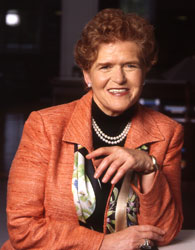
Author Deborah Lipstadt — perfectly prepared to appreciate and convey the complexity and historical import of the Eichmann trial.
Such absurdity is the world Arendt found evidenced by Eichmann. But she was incorrect about him. Eichmann had been a dyed-in-the-wool Jew hater for years, as a document he wrote in Argentina, to which Lipstadt had access, affirmed. In that document, he wrote that the leaders of the Nazi party were his idols and that he regretted only that he had not succeeded in killing more Jews. But Mailer was wrong, or merely partial, too. Evil’s two aspects—monster and middleman, demon and paper pusher—can subsist in a single human being.
Despite the fact that Eichmann was caught, tried, and punished and despite her victory in the David Irving case, Lipstadt, when estimating the power of prejudice, often strikes a cautionary, if not pessimistic note. As she put it in Denying the Holocaust, “Reasoned dialogue has a limited ability to withstand an assault by the mythic power of falsehood . . . There was no rational basis to the Nazi atrocities. There was, however, the mythic appeal of anti-Semitism.”
That truth and reason face an uphill battle does not diminish Lipstadt’s commitment to them. “Although history will always be at a disadvantage when contending with the mythic power of irrational prejudices,” she writes, “it must contend nonetheless.” Finally, it must be said that though anti-Semitism is the focus of her work, it is not the only form of lethal prejudice she engages. The Eichmann Trial concludes with words from a survivor of the Rwandan genocide who tells her, “Future generations, those who were not there, must remember. And we who were there, must tell them.”

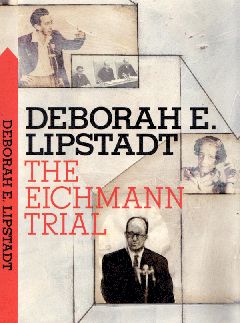
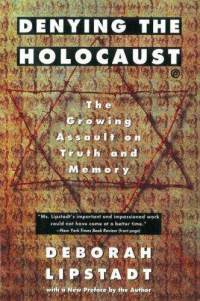
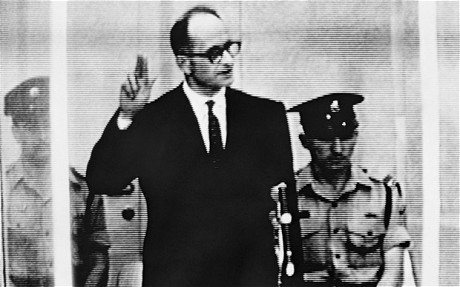
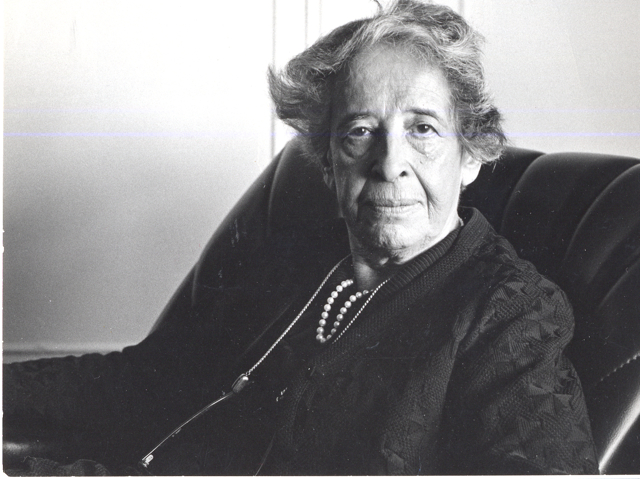
Excellent piece, HB. One of the most interesting features of these recurring genocides are the fanciful fig leaves our conscious minds feel compelled to concoct, the better to disguise our naked brutality from ourselves. We are all descended from mass murderers going back to the extinction of the neanderthals whose memory is preserved as the monstrous giants and trolls of countless fairy tales. Of course, the monsters are us. Evil is unexceptional and in that sense, utterly banal.
Of course, Arendt’s conception of evil’s “banality” is rather ahistorical, as Raul Hilberg showed in the early chapters The Destruction of the European Jews (a book whose publication Arendt had strongly discouraged) the anti-Semitic legislation (really the prelude to genocide) of both the Third Reich and Fascist Italy during the 1930s were not novelties but a revival of medieval laws that had still been in effect in much of pre-Enlightenment, pre-Napoleonic Europe.
Was this really “banality” or was it European identity reasserting itself?
How much of this “banality of evil” concept is just another effort of Arendt’s to dissociate the philosophy of her teacher, Heidegger, from his political association with Nazism? After all, in her political thought, she seems focused on labeling totalitarian as “inauthentic” while imagining democracy as “authentic” — so even if her politics were the opposite of her teacher’s she still thought in categories that he had defined.
[Side note: Richard J Evans’ Lying about Hitler is an interesting account of the Irving v. Lipstadt trial, from the point of view of the historian who was hired to evaluate Irving’s mishandling and distortion of the historical evidence.]